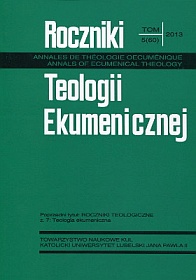“The Wolf Will Live with the Lamb” (Isaiah 11,6): The Integrity of the Creation according to the Orthodox Theology
Abstract
The ecological crisis that we recently have been experiencing, challenges us to consider the issue of the integrity of creation. Creation has been groaning while it has been waiting in eager expectation for the sons of God to be revealed (cf. Romans 8, 18-22). However, countercurrents against the secular tides have inspired hope; on 16th January 2013 the Heads of Christian Churches in Poland, united in Polish Ecumenical Council, as well as the Chairmen of the Polish Episcopal Conference of the Roman Catholic Church signed the Appeal of Churches in Poland for the Protection of Creation. In this document they make an appeal to all the faithful, and state and self-government authorities to undertake a new way of life that reflects an embracing and appreciation for Christian dignity and Christian vocation.
The following article presents biblical and theological foundations to understand the issue of the integration of creation according to the Orthodox theology. The article consists of three parts. The first part depicts the relationship between God, Man, and Creation. Jesus Christ, thanks to the Mystery of Incarnation, became physical matter in order to initiate a process of reintegration and reunification of the broken and divided world. Thus, thanks to the “corporality” Incarnation, it is matter that enables contact and connection between man and God. Hence, it should be stated that every single man needs a developed relationship with the world of nature. But this relationship should not be consumerist or utilitarian. People should humbly recognise that everything, including the natural world, is a gift. The second part of the article focuses on a Eucharistic and ascetic attitude towards creation. Finally, the last part depicts some of the Orthodox saints who are the true examples of humility and love and who teach us how we should treat creation.
References
Алфеев І.: Таїнство bіри. Вступ до православного богослов’я. Київ 2009.
Архимандрит Василий: Входное: Элементы литургического опыта таинства единства в Православной Церкви. Богородице – Сергиева Пустынь 2007.
Аверинцев С.: «Книга Природы». W: Tenże. София-Логос. Словарь. Собрание сочинений. Київ 2005.
Czaczkowska I.: Pomiędzy potopem a tęczą. Ekumeniczne studium integralności stworzenia, Lublin 1998.
Dostojewski F.: Bracia Karamazow. Tł. A. Wat. Warszawa 1984.
Kempiak R.: Stworzenie jako obraz Boga w Biblii. W: S. Niziński (red.). Ekologia a duchowość chrześcijańska. Poznań 2009.
Leśniewski K.: Ecumenical Patriarch Bartholomew’s „Green Message” to the World. „Roczniki Teologii Ekumenicznej” 3 (58):2011 s. 33-48.
Meyendorff J.: Teologia bizantyjska. Teoria i doktryna. Tł. J. Prokopiuk. Kraków 2007.
Минея праздничная с добавлением служб из Триоди Постныя и Цветныя. Київ 2009.
Патріарх Варфоломій: Віч-на-віч із тайною. Православне християнство у сучасному світі. Переклад Д. Морозова. Київ 2011.
Преподобный Софроний: Старец Силуан Афонский. Москва 1996.
Quenot M.: Ikona i kosmos. Inne spojrzenie na dzieło stworzenia. Tł. H. Paprocki. Białystok 2007.
Syméon le Nouveau Théologien: Traités théologiques et éthiques. Paris 1966.
Theokritoff E.: Prawosławie a ochrona środowiska naturalnego. W: K. Leśniewski (red.). Prawosławie. Światło ze Wschodu. Lublin 2009.
Wojciechowski K.: Ekologia w nauczaniu Kościoła – przyroda jako dzieło Boga. W: S. Niziński (red.). Ekologia a duchowość chrześcijańska. Poznań 2009.
Яннарас Х.: Свобода етосу. Переклад В. Верлока. Київ 2003.
Зизиулас И.: Общение и инаковость. Новые очерки о личности и церкви. Перевод М. Толстолуженко. Москва 2012.

